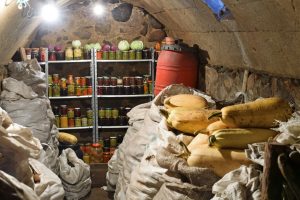Top Cold Storage Ideas
Cold storage solutions are essential for preserving food, pharmaceuticals, and other temperature-sensitive items. As businesses and households strive for efficiency and sustainability, innovative cold storage ideas have emerged. This article explores some of the top cold storage ideas that can help you optimize space, reduce energy consumption, and maintain product integrity. Top Cool Storage Ideas
1. Walk-in Refrigerators and Freezers
Overview
Walk-in refrigerators and freezers are ideal for businesses with high-volume cold storage needs, such as restaurants, grocery stores, and food processing facilities. These units provide ample space for inventory, ensuring products remain at optimal temperatures.
Benefits
Efficiency: Walk-in units allow for better organization, reducing the time staff spends searching for products.
Customization: Many walk-in freezers come with adjustable shelving, allowing businesses to tailor the layout to their needs.
Energy savings: Modern models are designed to be energy efficient, lowering electricity bills while maintaining temperature.
2. Commercial Blast Chillers
What is a Blast Chiller?
Blast chillers rapidly cool food to safe temperatures, preventing bacterial growth. They are vital for restaurants and catering services, allowing chefs to prepare meals in advance without compromising quality.
Advantages
Quick cooling: Blast chillers can reduce the temperature of hot food from 160°F to 39°F in less than 90 minutes, ensuring food safety.
Flavor preservation: Fast cooling helps retain the taste and texture of food, making it ideal for high-quality dishes.
Versatility: These chillers can be used for various products, including meats, seafood, and baked goods.
3. Under-Counter Refrigerators
Space-Saving Solutions
Under-counter refrigerators are a great way to maximize space in kitchens and bars. They fit seamlessly beneath counters, providing easy access to chilled ingredients without taking up additional room.
Key Features
Accessibility: Staff can quickly grab ingredients, streamlining food preparation.
Design versatility: These units come in various sizes and styles to fit different kitchen layouts.
Temperature control: Many under-counter refrigerators have precise temperature controls, ensuring food stays fresh.
4. Refrigerated Display Cases
Enhancing Visibility and Sales
Refrigerated display cases are perfect for grocery stores, cafes, and bakeries. They showcase products while maintaining optimal temperatures, encouraging customer purchases.
Benefits
Attractive presentation: Display cases enhance the visual appeal of food items, making them more enticing to customers.
Easy access: Customers can easily see and reach for items, boosting sales.
Temperature monitoring: Many models come with digital displays that monitor temperatures, ensuring product safety.
5. Smart Refrigeration Systems

Embracing Technology
Smart refrigeration systems use IoT technology to monitor and control temperature settings remotely. These systems are becoming increasingly popular in commercial settings.
Advantages
Remote monitoring: Managers can check temperatures from their smartphones, ensuring products remain safe.
Alerts and notifications: Smart systems can send alerts if temperatures deviate from set parameters, allowing for quick action.
Data analysis: These systems often provide analytics to help businesses optimize energy usage and reduce costs.
6. Temperature-Controlled Shipping Containers
Portable Cold Storage
Temperature-controlled shipping containers are excellent for businesses that require mobile cold storage. They can be used for transporting perishable goods or as temporary storage at events.
Benefits
Mobility: These containers can be easily transported to various locations, making them ideal for catering, events, or remote worksites.
Versatile use: Suitable for various products, including pharmaceuticals, fresh produce, and frozen goods.
Robust insulation: Designed to withstand external temperature changes, maintaining a consistent internal climate.
7. Cold Storage Warehouses
Scaling Up
For large businesses, cold storage warehouses provide expansive space for storing inventory. These facilities are essential for logistics companies and large-scale food distributors.
Key Features
Temperature zoning: Warehouses can have multiple temperature zones to accommodate various products.
Automation: Many modern cold storage warehouses utilize automated systems for picking and packing, improving efficiency.
Energy efficiency: New construction methods and technologies aim to minimize energy consumption in these facilities.
8. Ice Storage Systems
Innovative Solutions
Ice storage systems are a unique cold storage solution that uses ice to keep products cool. They are particularly beneficial in reducing peak electricity demand during hot weather.
Advantages
Energy savings: Ice storage can significantly reduce energy costs by shifting cooling loads to off-peak hours.
Environmental impact: Using ice for cooling can lower a facility’s carbon footprint, making it more sustainable.
Reliability: Ice storage systems can provide backup cooling during power outages.
9. Home Cold Storage Solutions
Maximizing Space at Home
For households, implementing effective cold storage solutions can help manage food inventory and reduce waste. Here are some ideas for home setups.
Strategies
Chest Freezers: Adding a chest freezer can provide ample space for bulk purchases and seasonal produce, helping you save money and reduce food waste.
Beverage Coolers: Dedicated beverage coolers can help keep drinks chilled, freeing up space in your main refrigerator for perishables.
Clever Organization: Utilizing clear bins and labels in your fridge and freezer can help you keep track of what you have, ensuring you use items before they expire.
10. Sustainability in Cold Storage
Eco-Friendly Practices
Sustainability is becoming a crucial aspect of cold storage solutions. Implementing eco-friendly practices can help businesses reduce their environmental impact.
Best Practices
Energy-efficient equipment: Opt for Energy Star-rated appliances and refrigeration systems to minimize energy usage.
Insulation improvements: Upgrading insulation in cold storage areas can significantly reduce energy costs.
Renewable energy sources: Consider using solar panels or wind energy to power cold storage facilities, further reducing carbon footprints.
Conclusion
Incorporating innovative cold storage solutions is essential for businesses and households alike. From walk-in coolers to smart refrigeration systems, there are numerous options to enhance efficiency and maintain product quality. By adopting these top cold storage ideas, you can optimize space, reduce energy consumption, and ensure the safety of your temperature-sensitive products. Top Cool Storage Ideas

Recent Comments